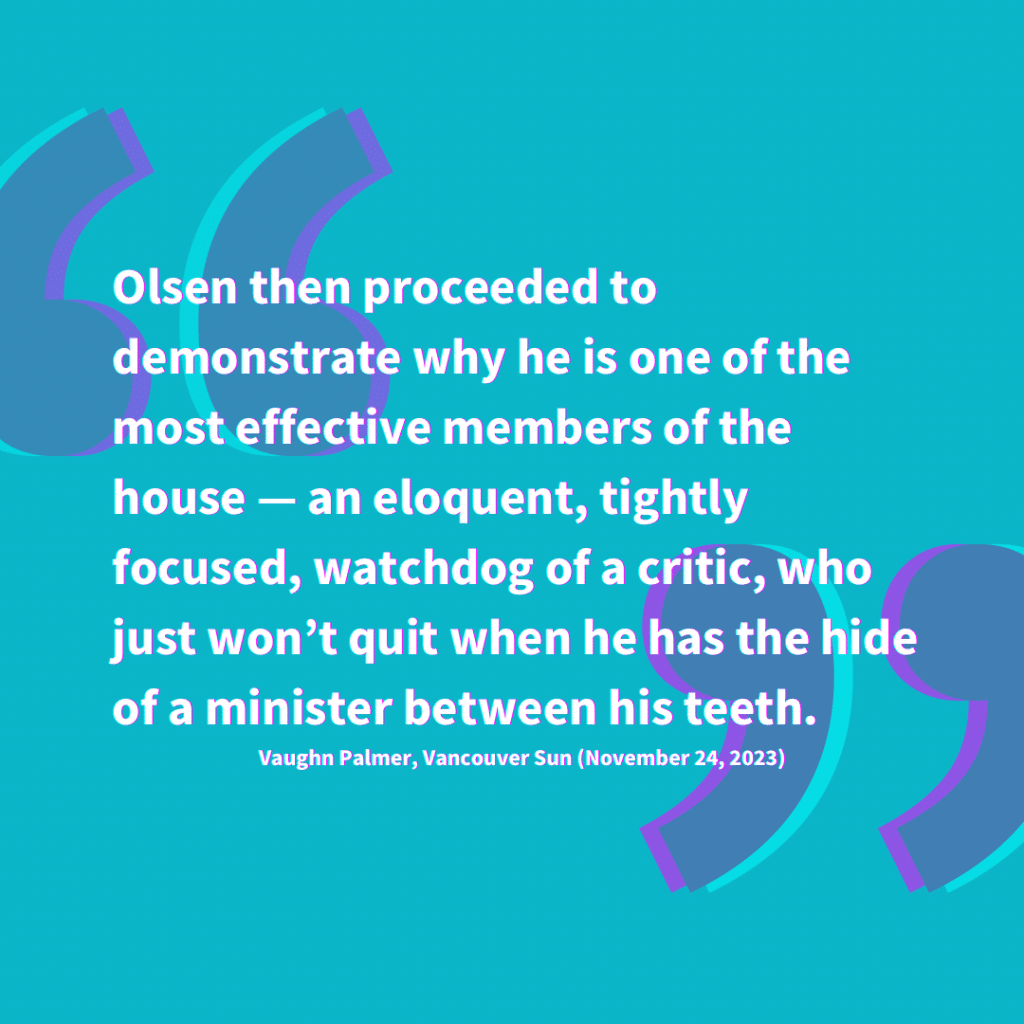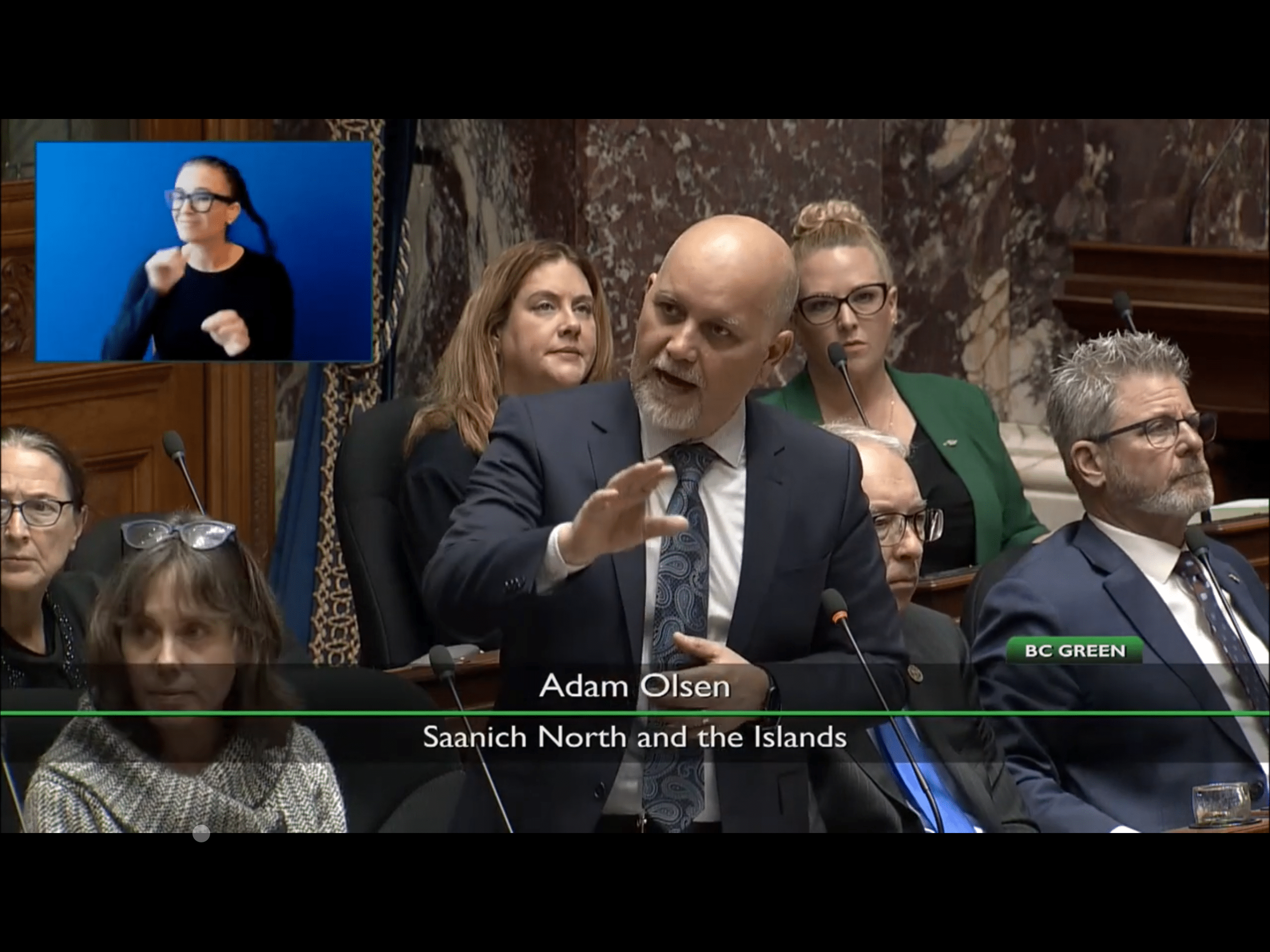In preparation for the final session (Spring 2024) of the 42nd Parliament, I look back on this term and reflect on the pace of life as a legislator, house leader, and the role of opposition members as government critics.
On Pace
The pace of politics is fast. Each session comes and goes. In the lead up, the energy builds in anticipation. During session the four-day legislative weeks move quickly. And, before we know it the government house leader is adjourning for summer or winter break.
The pace of government is slow. Necessarily slow—and in a well-functioning democracy it needs to be slower. New laws or statutory amendments should be informed by public engagement and consultation. They should be introduced, and the public given enough time to understand the implications. Finally, the government should be prepared to make adjustments based on the public response.
In a democracy it is not too much to ask that the public has the benefit of the learning about the proposed changes and has time to communicate with their elected representatives their experiences, ideas, and concerns.
An excellent example of a failed legislative change is with Bill 34: Restricting Public Consumption of Illegal Substances Act. The bill passed on November 8, 2023. But, on December 29, 2023, the Supreme Court of British Columbia granted a temporary injunction suspending the new law until March 31, 2024.
No matter what you think about the policy, none of the effort and expense of frontline workers, lawyers, and the BC Supreme Court would have been necessary had the provincial government allowed a democratic and respectful legislative process. The program should be thoughtful, well-planned, with a methodical roll-out.
Frantic house management, cabinet ministers scrambling the introduction and debate of their legislation into the assembly is an external indication of a government with no plan. It is a government who are just making a series of actions.
Two key measures of a healthy democratic institution are transparency and accountability. No government should fear the public seeing their legislation. When the government mismanages their own legislative agenda, either deliberately or by incompetence, when they limit public awareness of legislative changes by time-limiting debate, they sacrifice transparency and accountability.
On emergent autocratic behaviour
As we turn the page on 2023, I have found myself repeating a familiar criticism of the increasingly autocratic behaviours of our current provincial government.
Since they gained a majority in 2020, they repeatedly manipulate timing and accessibility to benefit their politics and limit the good democratic function of our institution.
Additionally, I have raised alarms that we are witnessing a dangerous blurring of the critical division of powers between the legislative and executive branches and flagged concerns our current Premier’s Office is showing an unhealthy amount of paternalism, and political paranoia.
I understand that governance is boring, and the cut and thrust of politics is far more exciting. It is so much more intriguing for citizens and easier for the media to focus on the personalities, the drama, the disagreements, and the political soap opera.
Social media has commodified our attention. Corporate interests develop and extract it as a resource by fracking, refining, and isolating our anger—poking our rage—and political parties know that politics outperforms governance on social media platforms. So, we (me included) often focus our communications on the emotional issues rather than the boring process.
Our legislative process has been hijacked by a growing trend of government communications delivering tightly scripted media availabilities announcing opaque policy changes designed to attract click-bait headlines, delivering a strong emotional response, and good feelings.
Media access has been limited with only one question and a follow-up allowed to cabinet ministers and government bills are also increasingly void of detail. Government argues this allows greater flexibility but empowering governing through regulation out of the scrutiny of the public is neither transparent nor accountable.
On Bill 34, they were moving open drug use out of public spaces but offering no place for people to go. Out-of-sight-out-of-mind. I didn’t oppose the bill because I want to see public drug use, Sonia and I raised the same issues that concerned Justice Hinkson who granted the temporary injunction.
In this case, process is the issue!
On counter-balancing government
Our system of governance requires a strong counterbalance to the governing members. No matter who is sitting in the Premier’s seat, or who they are flanked by, or what colours they fly on their flag, the public needs members sitting across from them who are up for the task of holding the government accountable.
It’s not an easy job and it’s not personal. Opposition members must be relentless. As critics, we have little time, and we are under-resourced compared to cabinet ministers who have the entire bureaucracy at their disposal if they need it.
As we have seen each of the last three years, major legislative changes crammed in at the end of the annual parliamentary calendar force the government to exert ultimate control over the legislature, shutting down debate through time allocation and closure, well before the opposition has done their job.

On being a proud and effective critic
Over the past four years, I have grown in my role as a member of the opposition. We are the election winners from political parties that “lost” the election. The cultural narrative relegates us to “government-in-waiting” status.
However, the skills and temperance needed to be an effective critic are different than what is needed to be a cabinet minister. The public requires opposition members who are focused on good governing, not good politics.
I fully embrace the work as an opposition critic. I do my best to speak at second reading to as many bills and participate in the detailed clause-by-clause committee stage debate as possible. Budget Estimates in the Spring session offers a unique opportunity to engage cabinet ministers directly on their budgets and their overall philosophical approach to their work. In 2023, I spoke to all but a few ministries.
Vaughn Palmer, in his Vancouver Sun editorial, summed up my work as critic, “Olsen then proceeded to demonstrate why he is one of the most effective members of the house—an eloquent, tightly focused, watchdog of a critic, who just won’t quit when he has the hide of a minister between his teeth” (November 24, 2023).
Politically, opposition members oppose government to distinguish themselves for the next election. A good critic on the other hand is not centrally motivated by politics but rather good governance—good policy and good process. Like I said earlier, the boring stuff.
On being house leader
I am also the the BC Green Caucus House Leader. The house leaders have an important job because in a well-functioning democratic institution these are the individuals that are responsible for working together to manage the day-to-day function of the assembly.
Even when the politics are running hot, house leaders need to be able to set it aside and work together to ensure the cabinet ministers and critics are ready to debate legislation. The government house leader carries most of the responsibility because they control the agenda. The opposition house leaders are mostly in a responsive posture responding and accommodating.
The house leaders are also members of the Legislative Assembly Management Committee (LAMC), and administration, finance, and security sub-committees.
Over the past few years, the house leaders have been working on improving the accessibility of private members (all members not in the cabinet), because our current rules are woefully inadequate.
As a member of a special committee struck to review private members business earlier this year, I’m thrilled how effectively and collaboratively we worked to table a consensus report with recommendations for improvement for the 43rd Parliament.
I look forward to the government house leader bringing those changes forward in the upcoming Spring session to complete that important work.
In summary
It’s incredible how quickly time passes as an MLA. In February, Budget 2024 will be introduced, the unofficial start of the race to the next provincial election finish line. While I prepare for a frenetic scramble, I remain a dutiful servant of the democratic process in my role as legislator and house leader, and a calm, committed critic until the final adjournment of legislative assembly and the dissolution of the 42nd Parliament.


0 Comments